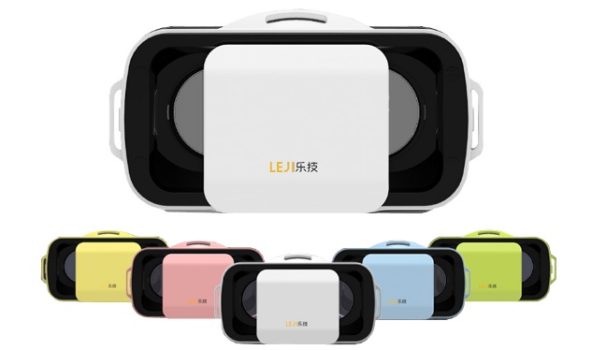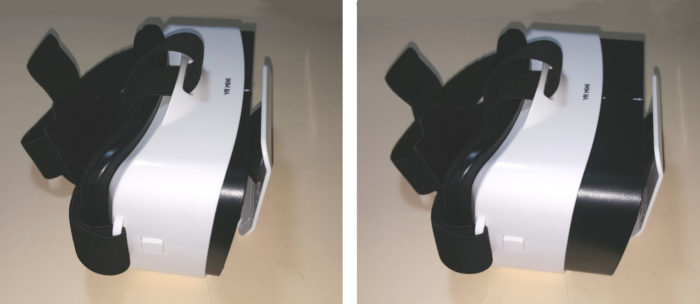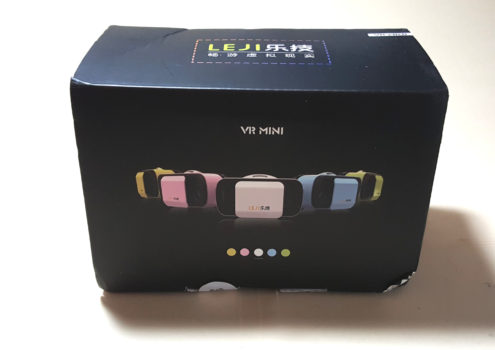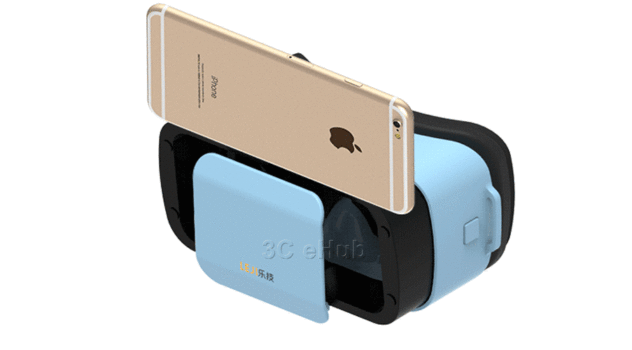Update: In August, I bought a FiiT VR 2S, and that is now my new favorite. Another headset I’m recommending is the BoboVR Z4 headset, which has a 120-degree field of view, built-in headphones, and a built-in control button.
 The Leji VR Mini that I ordered from AliExpress for $11 has just arrived, and I love it. It comes in a bunch of colors, including yellow, pink, light blue, and light green, but I got the white one because I’m boring.
The Leji VR Mini that I ordered from AliExpress for $11 has just arrived, and I love it. It comes in a bunch of colors, including yellow, pink, light blue, and light green, but I got the white one because I’m boring.
It came with a lens cleaning cloth, some QR Codes that take you to Chinese-language websites, and a tiny little Chinese-language instruction sheet. Fortunately for those of us who don’t read Chinese, this headset really needs no instructions.
1. Field of view
The field of view is officially listed as 96 degrees, which is the same as the Gear VR.
And even though the headset looks tiny, I could actually see some of my smartphone outside my Samsung Galaxy S6’s 5.1-inch screen.
The company says it will hold smartphones with screens of 4.7 to 6.0 inches.
2. Weight
It weighs just 209Â grams, or 7Â ounces. By comparison, the DeePoon, another new headset with a similar design, weighs 9 ounces, and costs about three times as much.
3. Straps
Usual straps that go around the sides and over the top of the head. These are stretchy, which might not work for a heavier headset, but is fine with the Leji.
4. Fits over glasses
My glasses, which are tiny, definitely did not fit. On the plus side, the lenses are adjustable.
5. Adjustable lenses
The interpupillary distance is adjustable, which is the distance between the lenses. You change it by moving the lenses closer together or further apart. You have to take off the headset to do this, which is slightly inconvenient — some headsets have an external dial, so you can adjust the lenses while wearing the headset. However, given the small size, there was probably too little room to fit in that mechanism.
In addition, the focal distance of the lenses is adjustable as well.

To adjust the focus, click on the white buttons on sides of the headset. This makes the front of the headset, the part that holds the smartphone, pop out away from the main body of the viewer. Normally, I don’t like this approach because when you hold the viewer tight, or take the phone in and out, it’s too easy to squeeze everything together and ruin the focus.
However, with the Leji, if you try to push the headset back together, there will be a little resistance and you will hear clicks as the phone moves close to the lenses. I like this approach.
6. Ready for augmented reality
The plastic piece that keeps the phone in place has open sides, leaving plenty of room for the smartphone’s rear-facing camera.
That means that all augmented reality applications work work just fine.
7. Fits over audio and power cables
The open sides mean that there is plenty of space for cables as well.
8. Controller
This is the one missing feature of this headset — no built-in button. You will either need to stick with look-to-activate apps and VR videos, or get an external controller. Some sellers actually bundle the controller in with the headset.
9. Ease of use
I found this headset extremely easy to use.
The headset did not come with a Google Cardboard QR Code, which was very disappointing. But I found that the Vrizzmo QR Code seemed to work fine.
10. Price
You cannot beat the price of this headset. It is a very decent headset, one that compares very favorably with headsets costing several times more. It is also an excellent alternative for anyone considering buying a headset made of cardboard.
This is a great headset to get to tide you over while waiting for the Daydream sets to come out, or to buy for your kids.
It’s available for $10 from AliExpress, $10 from GearBest, $12 from Amazon and $13 from GeekBuying. If you search the sites, you can also find offers that are bundled with a Bluetooth remote controller. (Disclosure: I’ve included affiliate links where available.)
If you buy in bulk from AliExpress, the prices fall to less than $5 per unit — a great option for corporate deployments.
- Analysts predict drop in headset sales this year - March 25, 2025
- OSgrid enters immediate long-term maintenance - March 5, 2025
- OSgrid wiping its database on March 21: You have five weeks to save your stuff - February 15, 2025



